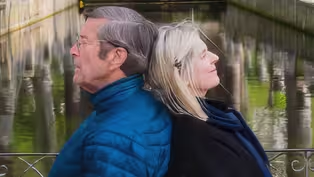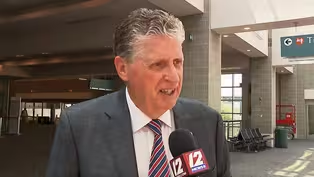
Beyond Words
Clip: Season 5 Episode 31 | 8m 55sVideo has Closed Captions
Colin Channer finds a connection between his homeland and the Ocean State.
Rhode Island’s new poet laureate was born and raised in Jamaica, studied in New York, and now teaches literary arts at Brown University. Colin Channer finds a connection between his homeland and the Ocean State--which is woven into many of the works in his books of poetry. Learn more about the role of the poet laureate and find out about his dream to bring a festival of verse to the state beaches.
Problems playing video? | Closed Captioning Feedback
Problems playing video? | Closed Captioning Feedback
Rhode Island PBS Weekly is a local public television program presented by Ocean State Media

Beyond Words
Clip: Season 5 Episode 31 | 8m 55sVideo has Closed Captions
Rhode Island’s new poet laureate was born and raised in Jamaica, studied in New York, and now teaches literary arts at Brown University. Colin Channer finds a connection between his homeland and the Ocean State--which is woven into many of the works in his books of poetry. Learn more about the role of the poet laureate and find out about his dream to bring a festival of verse to the state beaches.
Problems playing video? | Closed Captioning Feedback
How to Watch Rhode Island PBS Weekly
Rhode Island PBS Weekly is available to stream on pbs.org and the free PBS App, available on iPhone, Apple TV, Android TV, Android smartphones, Amazon Fire TV, Amazon Fire Tablet, Roku, Samsung Smart TV, and Vizio.
Providing Support for PBS.org
Learn Moreabout PBS online sponsorships remember the roots of poetry are in song, are in ritual, are in prayer, are in magic.
- [Pamela] Rhode Island's new poet laureate Colin Channer believes there is a mystical connection to such words.
- When we say we're enchanted by something, there's the idea of the incantation.
How is it that we can listen to a song in a language that we cannot speak, yet be moved by that song?
- [Pamela] The author of two collections of poetry, Channer says verse gives power to the micro-moments of life.
- We have mirrors and we have windows, right?
The mirrors are the elements of a piece of writing that make you see yourself, and the windows are the aspects that give you a view into different worlds.
And so as a public poet in the role of the poet laureate, I'm in a position to present poetry that will do both.
- [Pamela] Channer is bringing both worlds to his role in Rhode Island.
He was born and raised in Jamaica where his mother declared he was lucky.
- I think that's part of my good fortune.
I describe myself as a weird kid with a strong mother who was influenced so much by the music of Jamaica, he didn't realize he was learning the art of poetry through the lyrics of people like Bob Marley.
- [Pamela] His father, a police officer, died when he was just 12 years old.
His mother, a pharmacist, was his major influence and a storyteller.
- I would listen to her and her friends on the veranda in Kingston, Jamaica, laughing and telling stories.
She spoke her mind.
She never hesitated.
You know, she would use quite colorful language, and she would often declare, "I'm no lady."
(laughing) She would say, "I am no lady.
A lot of the ladies come to me for Valium because they can't speak their minds."
(chuckles) - [Pamela] Channer eventually moved to New York and became an associate professor of literary arts at Brown University in 2016, where he continues composing poetry today.
- There's some times where I feel a poem is on me, and it feels like kind of haunting where I know that I am rising a little bit out of the every day.
It's a calling, and it's a practice.
It's kind of funny when you look through and see drafts of poems because some of them are just scraps that didn't make it.
I have very different processes.
Sometimes an idea comes, sometimes a line comes, sometimes I overhear things.
- [Pamela] He is following in the footsteps of late Brown professors Michael Harper and CD Wright.
Channer is the state's seventh poet laureate, a position generated by the general assembly in 1987.
The appointment is for five years with $1000 stipend for each.
The poet laureate has free reign as a literary arts advocate in the Ocean State.
Channer reveals he wants to create something special.
- I would love to see a literary festival in the state on the scale of the Newport Jazz Festival, right?
We have some of the greatest institutions of learning in the country here in Rhode Island.
And we also have a beautiful landscape.
You know, when I go to the state beaches, I just keep thinking every boardwalk is a stage.
And imagine if there were these events down in the state beaches, right, where you could bring your blanket, right, and you could hear the world's greatest authors and the region's greatest authors and the greatest local authors right there as the sun is going down behind you, right?
It would be so marvelous.
- [Pamela] That marvelous experience is one Channer has already co-created, the Calabash Literary Festival in his native Jamaica.
- The way in which the ocean is never far in Rhode Island, you know, that reminds me a lot of the Caribbean, but also, too, the way in which people here are vocal.
Rhode Islanders are not quiet people.
(laughs) - So you felt like you fit right in?
- I fit right in.
Rhode Island people are expressive, and they like food, the cultural admixture as well.
You know, Portuguese, Italian, Irish, African American, right, Cambodian.
It has that kind of complex mixture, which is a presumption in the Caribbean.
So it's that twin-ness of belonging and exploration that I think are part of who I am as a poet and as a person.
- And yet you didn't start writing until you were in your 30s.
- Yeah.
- [Pamela] Which people might find unusual.
- Yeah, my first book came out, I was 35.
My first poetry book came out when I was in my 50s.
- And that's surprising.
- It is surprising.
It is surprising, and it's completely not recommended.
(laughs) But also, too, I think a kind of openness and a kind of curiosity about what's possible is something that has always driven me.
And so I was curious about what it would mean to write poetry seriously.
And I kind of did it on a lark.
- [Pamela] That spur of the moment decision has taken flight in his most recent collection of poems, Channer was inspired to write about Rhode Island's stormy past after viewing photos of the destruction wrought by Hurricane Carol in '54 and the hurricane of '38.
It's titled "Eye."
- "Mist and drizzles turn to buffets, then all normal snaps from roots havoc sent to ravage wave to wave.
So it was for Wampanoag, Nipmuc, Niantic, Pequot, Narragansett deluge-colonizing, gust insults, bodies shook like canoes in crosscuts, pneumonic fear and the drowned boys last view, the eye, what stillness.
One new God's promise.
Peace."
We often think of a hurricane as a destructive force, and it is, right, but so was colonization.
And so I imagine in this poem, the hurricane as this force that comes from offshore onto land the way in which colonizers came from the ocean and came on the land, right?
And what it might have felt like for, you know, Native Americans.
- When people read your poetry, what do you want them to come away with?
What feeling?
- It's not so much a word, but a sound.
I want them to come away with some version of, hmm.
Beyond words.
- The post of poet laureate has one specific requirement,
Video has Closed Captions
Clip: S5 Ep31 | 9m 56s | The power of Art and Love when caring for someone with Alzheimer’s. (9m 56s)
Video has Closed Captions
Clip: S5 Ep31 | 4m 51s | Why a Democratic Rhode Island politician publicly raised concerns about President Biden. (4m 51s)
Providing Support for PBS.org
Learn Moreabout PBS online sponsorship
- News and Public Affairs

Top journalists deliver compelling original analysis of the hour's headlines.

- News and Public Affairs

FRONTLINE is investigative journalism that questions, explains and changes our world.












Support for PBS provided by:
Rhode Island PBS Weekly is a local public television program presented by Ocean State Media

